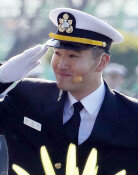How Can a Person with Color Blindness Become a Police Officer?
How Can a Person with Color Blindness Become a Police Officer?
Posted January. 13, 2005 22:56,
The suspicion was raised on Thursday that Huh Joon-young, chief superintendent general of the Seoul Metropolitan Police Agency, was favored in his military service. He has been unofficially appointed as the new chief of the Korean National Police Agency and his confirmation hearing at the National Assembly is scheduled for Friday.
When the appointee checked up his health on March 21, 1973 at a military hospital in Daegu, he was found to be colorblind and his naked eyesight in his left and right eyes were 0.08 and 0.06, said Yoo Jeong-bok, a lawmaker of the opposition Grand National Party and member of the Government Assembly and Home Affairs Committee of the National Assembly.
The result of the second medical examination on August 7, the same year, showed that his left and right eyesight was 0.06 and 0.02 respectively; as a result, he was classified as a reserve soldier.
He served his military duties in the current Defense Media Agency in Yongsan, Seoul, from February 21, 1976 to February 19, 1977.
Doubts were raised over how Huh Joon-young, who served as a reserve, become a police superintendent after passing the state foreign service exam in 1984. The appointment rules for police officers at that time stipulated that a person who has naked eye sights of 0.3 or more, or corrected eye sights of 0.8 or more without color blindness can become a police officer.
Minor partial color blindness may be healed over time, but color blindness is permanent, an eye doctor said.
It is also unconvincing how he could finish his undergraduate degree in public administration at Korea University in four years while serving his military duties. He did not take any years off in college.
In those days, a reserve solider served 24 hours a day and took two days off, so I was able to finish my undergraduate study while serving my military duties, the appointee responded.
Nevertheless, Dong-a Ilbo confirmed that he took 20 credits each in the first and second semesters in 1976 and attended all classes from Monday to Saturday. It is questionable how he did the two things at the same time.
needjung@donga.com




![반찬통 착색 고민 끝…‘두부용기’ 버리지 말고 이렇게 쓰세요 [알쓸톡]](https://dimg.donga.com/c/138/175/90/1/wps/NEWS/IMAGE/2026/01/09/133126593.3.png)


